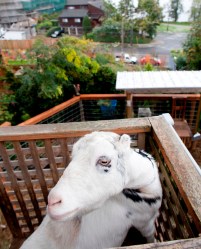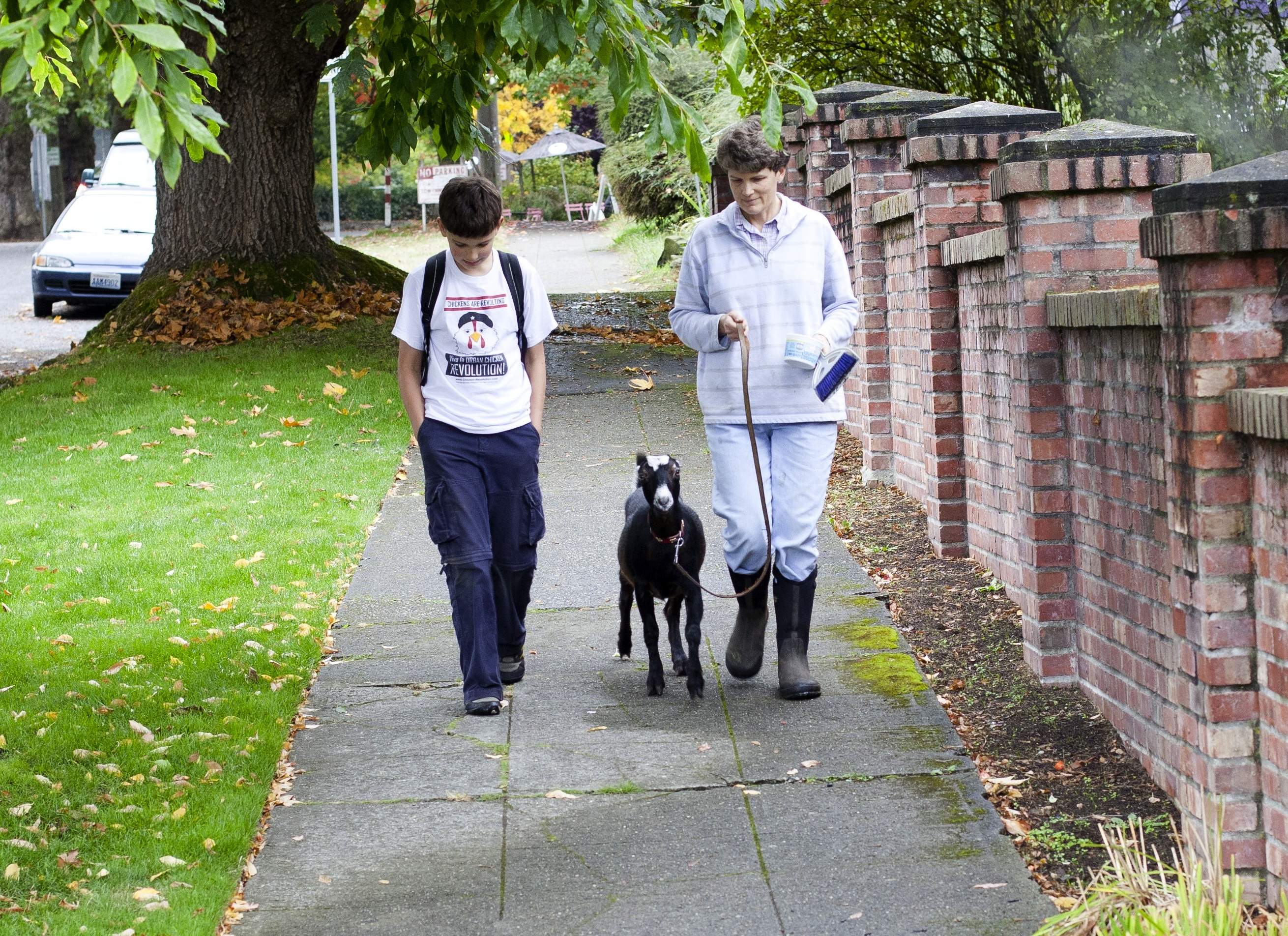Editor’s note: The following is an excerpt from the book City Goats: The Goat Justice League’s Guide to Backyard Goat Keeping by Jennie Grant. Grant has been called the “godmother of goat lovers” by TIME magazine and was the subject of a Seattle Weekly cover story. In the chapter excerpted below, Grant tells the story of her effort to change the backyard goat laws in Seattle.

Harley Soltes
Sadly, a little girl a quarter-mile from our home came down with a mysterious illness that turned into another illness that was life-threatening. Preliminary tests indicated she might have Q fever, a disease carried by goats … With their daughter deathly ill of an unexplained disease, [the parents] began to tell people that my goats were spreading a life-threatening disease. I could understand their anxiety, but given that the girl had never been to my home, let alone touched my goats, it seemed unlikely that Snowflake and Brownie had anything to do with her sickness. I invited the health department’s veterinary epidemiologist to come and see the goats and where they were kept. She felt that they were well quarantined and that it would be highly unlikely for them to spread disease … Within a few weeks, additional tests on the girl showed that she probably had cat scratch fever contracted from the family’s own cat. But by that time the damage was done. I had been reported to the Department of Planning and Development (DPD). Although concerns about my goats died down, the issue was now in the hands of the DPD, and the DPD insisted that my goats were farm animals and that their remaining in my yard was a violation of the zoning code.
Unsure of what to do, I wrote to Richard Conlin, a Seattle city council member who lived in my neighborhood and who I had read was working on local food and food security issues. His legislative aide, Phyllis Schulman, contacted me right away and came to my home to meet Snowflake and Brownie and see my goat yard setup. Initially, I asked if she might be able to help me get a waiver for my goats, but she explained that such waivers didn’t exist. She liked the idea of goats in the city and said, “Let’s see if we can’t just get the law changed.”
Was this even possible? Phyllis thought yes, why not? My goats were quiet and well behaved and, unlike cats, didn’t wander freely and treat other people’s vegetable gardens as their personal kitty litter boxes. Besides, Phyllis thought there might be other people in Seattle who would like to keep goats.
The idea that a city council member’s staff would be willing to help me change the law astonished and delighted me. Phyllis asked if I would be willing to gather community support if she took care of the administrative details. I was, and with that we shook hands.
Phyllis went right to work. She gained the support of the health department and investigated what other cities allowed goats and whether said goats ever caused problems. She spoke with Seattle’s animal control department to find out if they had the ability to catch and care for lost goats. In addition to this extensive research, Phyllis began filing the necessary notices for code change and convening the necessary meetings. And when the meetings took place, Phyllis was there with a whole spread of goat cheese.
I’m pro-goat and I vote!

Jennie Grant
In the meantime, I set out to gather signatures … I decided I’d call my organization the Association for the Legalization of Mini-Dairy Goats, aka the Goat Justice League. In the beginning, I couldn’t decide between the two names, hence the “aka.” Many people assume that the Goat Justice League was inspired by the Superhero Justice League, but it wasn’t. I had been thinking about the League of Women Voters — a group I have always admired for its moderate, sensible, and educated approach to politics. “Justice” I added because it communicated fairness but had an air of pompousness about it, too. I found out early on that the Goat Justice League was the superior name when a friend of mine came back from her rowing club with a sheet full of signatures and said, “There’s this very conservative middle-aged lawyer on the team. When I gave him the petition, he looked at it begrudgingly and then, while signing it, mumbled, ‘I never sign petitions, but what is this Goat Justice League? How can I not support them?’”
To get signatures, I sent petitions home with friends, and when they brought them back full, I repaid the favor in goat cheese. This got me several hundred signatures. The real bonanza, which took me to 1,000 signatures, was the Seattle Tilth Harvest Fair — a celebration of organic gardening. This fair is always packed with organic farmers selling their produce, a few good bands, and demonstrations of poultry raising and beekeeping. Tilth allowed me to bring Snowflake and Brownie, and with those two beside me, and several friends armed with clipboards helping me work the crowd, we were able to gather a signature every three minutes.
It was at the Harvest Fair that we also rolled out our membership opportunity, which turned out to be a hit with the public. Just before the Harvest Fair, a journalist asked me about the number of members in my organization, and I realized that I didn’t actually have any … At the fair, after someone agreed to sign the petition, I’d follow up by asking if they’d like to be a card-carrying member. They’d often look at me sort of funny, and you could tell they were thinking that I was going to hit them up for money, so I’d quickly explain that there was no cost. They’d just need to take the card and carry it around sometimes. I had 100 card-carrying Goat Justice League members in a single afternoon. I could have gotten even more, but I ran out of cards. (They were especially popular among 20-somethings.)
Word about the cards got out at the fair, and young people would come up and ask for them. They all said things like, “This is going to be great at a party.” (This got me wondering about the state of 20-something parties these days.)
Although I was sorely tempted to seek out the media to discuss the issue of goat legalization, Phyllis Schulman warned me not to. “The media is fickle,” she explained. “You never know if it will fry you or sing your praises.” She advised me to sit still and wait for the media to contact me. Phyllis also suggested that I frame the issue as one of tolerance rather than of opting out of the larger food system. I took Phyllis’s advice and let the media find the story on its own. When they did call, I’d say, “I just love going out in the morning to milk my goats, and I like to make cheese. It’s my hobby. They don’t bother anyone, so why not?”
At the public hearing, dozens of people spoke in favor of Snowflake, Brownie, and goats in general. Enthusiastic supporters waved signs that proclaimed, “I’m pro-goat and I vote.” One lone voice did rail against goats. She was a woman known around city hall for her rants against off-leash dog parks, and while she hated dogs in the city, she seemed to hate goats even more. She began with rather sensible concerns, such as goats jumping on fancy cars, but soon swayed off the road of rationality into descriptions of goats wandering into schools and pooping on desks, and goats heading into bars and drinking too much beer … This was a stroke of sheer luck — a coup that I could not have planned or even imagined. More persuasively than any highly paid Washington lobbyist, she convinced her audience that people opposed to goats in the city were certifiably nuts.
From this meeting on, the legalization of mini-goats was a slam-dunk. The committee voted unanimously in favor of goats, and the city council, upon hearing its recommendation, stamped the new ordinance with its approval. The ordinance stated that mini-goats were to be considered small animals, in the same category as cats and dogs. They would have to be 100 pounds or smaller, would require a license, would have to be disbudded and, if male, neutered. I was incredibly lucky. Phyllis Schulman, my first contact at city hall, was an avid lover of animals and goat cheese. The health department’s veterinary epidemiologist kept goats (she lived in the country), and Seattle is a tolerant, animal-loving city.
But in other places, you may encounter some tough opposition. When you do, try to remember to stay calm. You simply want to keep goats. They are your hobby, and contrary to what people may say, they are not smelly or violent and are no more likely to spread disease than dogs or cats. In addition, remember that there are people out there who would keep goats irresponsibly. To address this issue, you can remind people that laws are in place to address problems such as noise, trespass, animal cruelty, and property damage. If someone has a loud goat that is bothering neighbors, those neighbors will be able to oust those noisy goats through the existing noise regulations.

Harley Soltes
Lastly, there is the issue of fairness. If dogs and cats are allowed, why shouldn’t goats be? Dogs have very sharp teeth and are sometimes aggressive. They also sometimes bark loudly. Cats have no concept of property lines and cross them without remorse to attend to their business affairs in neighboring vegetable gardens and sandboxes. Yet despite these indiscretions, we allow dogs and cats. Shouldn’t we allow goats too?
Ending goat intolerance in your city
To find out if goats are legal where you live, the best place to start is with the zoning or planning department of your municipality. Most rules against goats come in the form of zoning regulations. Ask for a copy of the rules, so you know exactly what they say. Seattle’s rules were quite specific about swine, which, except for a clause allowing potbellied pigs, were expressly not allowed. (Apparently, some lawmakers in the past had it in for pigs.) However, the rules did not mention goats specifically. Rather, they stated that farm animals, such as “cows, horses, and sheep,” were prohibited on properties of less than 12,000 square feet. Often, there are setbacks involved in the farm animal rules. For example, the rule might say something like “farm animals must be kept 250 feet from any property line or any building.”
Do goats have rights in your city? Here are some questions to ask your zoning department officials:
- Are there any rules on the books that specifically stipulate whether goats are allowed or not?
- Are there any rules on the books that regulate the keeping of farm animals?
- Do the rules define what a farm animal is?
- Do the rules regarding the keeping of goats or farm animals specify a minimum lot size? (For example, many areas will allow you to keep goats only if you have an acre or more of land. The amount of land required by different municipalities is highly variable.)
- Are there setbacks? (For example, some cities may allow goats but require that they be kept a certain distance from the property line or buildings.)
- Do the rules say anything about the size of animal that can be kept?
- If goats are not allowed, is there any way to get a formal exemption? If so, what is the process and cost for obtaining an exemption?



